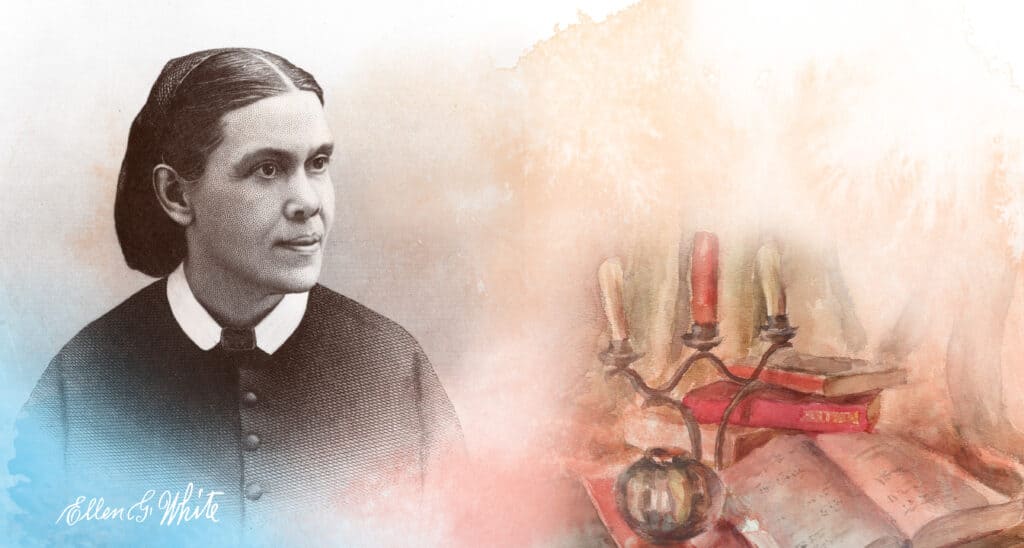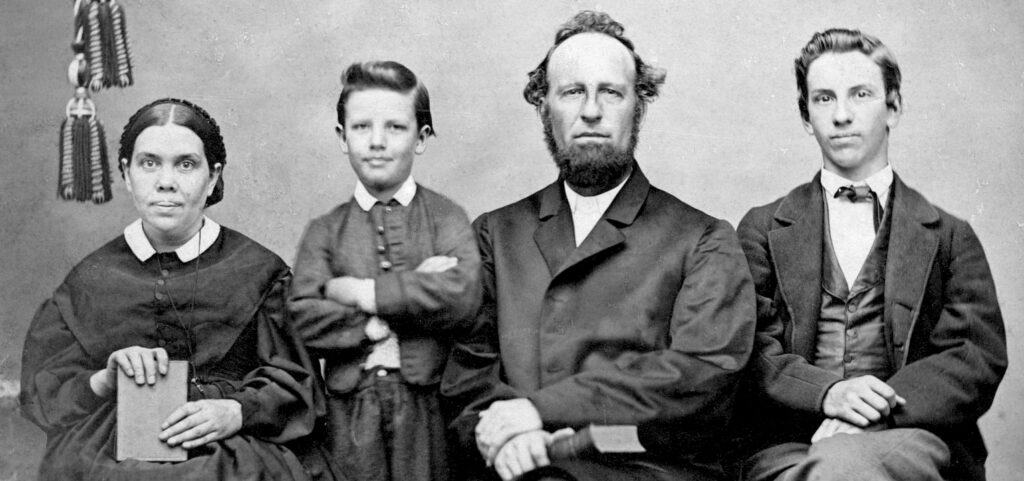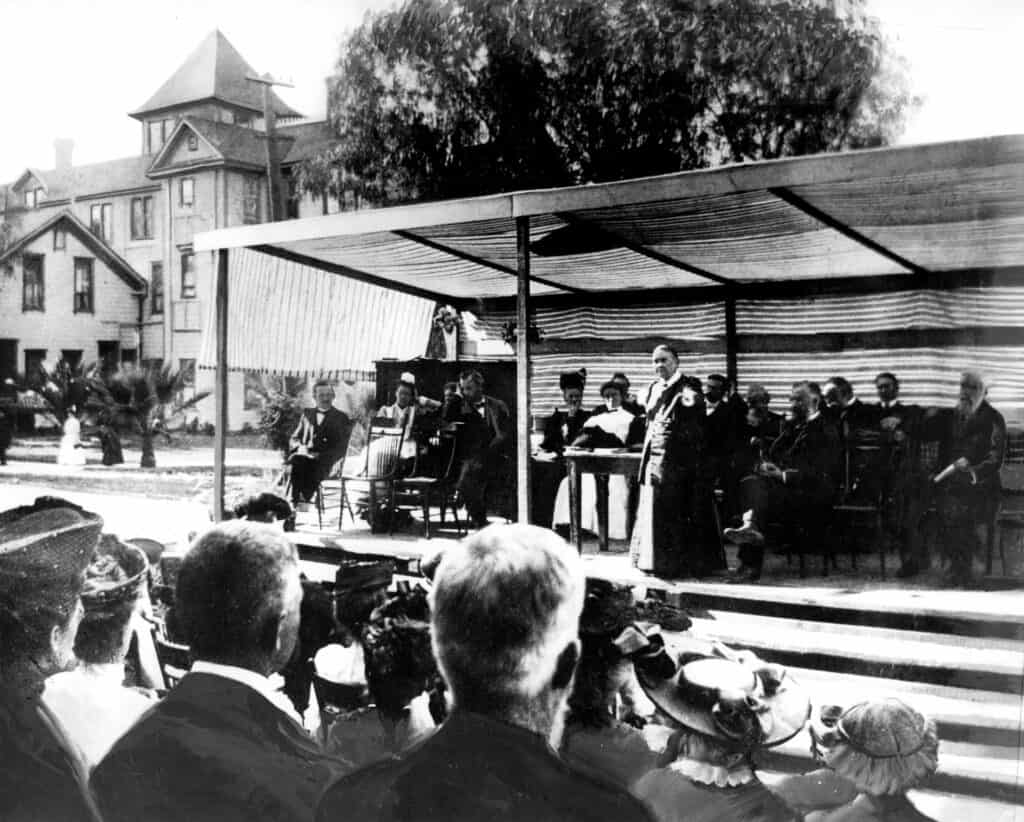
When reading about the Seventh-day Adventist Church, its history, or especially its involvement in health reform in the United States, you’ll likely come across the name Ellen G. White.
There’s good reason for that, as few others have demonstrated the wisdom, practicality, and spiritual leadership she exhibited in the formation of the denomination.

So what made this 19th-century woman so special?
We will look at:
Let’s introduce you to Ellen.
While you may not find her name in a history textbook, Ellen G. White made a significant contribution to the health reform movement in 19th-century America. She is also a highly-regarded pioneer of Seventh-day Adventism, as she played a key role in the formation of the denomination.
And her impact is still recognized today, both by Adventists and others. Smithsonian Magazine even named her as one of the “100 Most Significant Americans of All Time.”
She is the most translated female non-fiction author in the history of literature, as well as the most translated American non-fiction author of either gender.
By the time she passed away, her writings came close to 100,000 pages. This included 24 published books, 5,000 articles, and more than 200 informational leaflets.
Ellen White accomplished an amazing amount of things during her lifetime. But what she is most remembered for is the practical and spiritual counsel she gave, both in spoken word and written word.
Most of her ideas were well ahead of her time. She was widely recognized as having the prophetic gift (1 Corinthians 14:1-5; Romans 12:6) and was always careful to point her readers and listeners to God and the Bible as the source of truth.
She also advocated for improved personal health and hygiene, effective interpersonal communication, a more comprehensive approach to education, authentic spirituality, stronger church leadership, and more.
Much of her advice is still relevant today and has helped many people improve their lives and deepen their Christian walk.
Ellen was born on November 26, 1827, to the large Harmon family. She was the youngest of eight children, and they lived on a small farm in rural Maine at the time.
She was raised as a devout Methodist, but her family was forced out of the Methodist Church when she accepted William Miller’s preaching about the imminent return of Jesus.
Miller was a farmer-turned-preacher who studied the prophecies in Daniel and Revelation and concluded that the Second Coming of Jesus would be a literal event. This went against the popular belief of the time, which saw the Second Coming as a figurative or spiritual event.
Miller preached enthusiastically about the nearness of the Second Coming. Many people, including Ellen Harmon, believed in Miller’s prediction that Jesus would return soon. And then a date was even set for the event: October 22, 1844.
As you can imagine, the large group of “Millerites” were horribly disappointed when Jesus did not return on that date—which is why this date became known as “The Great Disappointment.”
Though crushed that Jesus did not return when predicted, Ellen Harmon joined a group of Christians who sought to deepen their study of the Bible after this unfortunate event. They also wanted to find out where Miller’s calculations had gone wrong.
Only 17 at the time, she became inspired by a message from God just a couple months after the Great Disappointment. She was encouraged that what they’d learned about Jesus’ literal return was indeed correct—but setting a date for it was in error.
She was renewed with hope that digging into the Scriptures was indeed what they were supposed to do. So she began traveling and encouraging those who’d also been disappointed at the outcome of Miller’s prediction.
In 1846, Ellen married James White, also a former Millerite. The two joined with others who continued studying their Bibles about Christ’s return and accepted the seventh day (Saturday) as the true Sabbath.

Her devout involvement with this group of Christians helped lead to the official founding of the Seventh-day Adventist Church in 1863.
A major part of Ellen White’s ministry was to lead people to the profound truths in the Bible—especially those that had been misunderstood or forgotten…or that had been distorted or de-emphasized by various traditions.
Since her writings included specified direction and instruction, she frequently made it clear that her words to others were only serving their true purpose if they reminded people to study their Bibles. She wanted her fellow Christians to better understand the God they serve and to prepare their hearts for the Second Coming of Jesus.
This is similar to the mission of many of the Bible’s prophets—to deliver a message from God that reminded people of His words. She took this conviction seriously as she believed the Bible to be “the rule of your faith and practice.”1
In a 1903 article published for a church-wide readership in The Review and Herald, she said,
Little heed is given to the Bible, and the Lord has given a lesser light to lead men and women to the greater light.2
This statement shows how she perceived her role. Though many people praised her eloquence in writing and speaking on spiritual topics, she did not see herself or her writings as “holy,” or equal to Scripture. She would have dismissed that idea as ridiculous!
While she considered herself among the “lesser lights” pointing toward Jesus, she also described the Bible as the “bright light” that people are to reflect to the world. And when this “bright light” is applied to our lives, it “will bind us in strong bonds to Jesus.”3
Ellen White saw her work as leading others to a deeper appreciation for biblical truth. We can compare this to the work of many prophets in the Bible, whom God used specifically to remind Israel of things they’d previously been taught but didn’t take to heart.
Additionally, she warned her readers and listeners to take human ideas and teachings with a grain of salt. She emphasized the many ways human ideas were far from perfect and that arguing back and forth about human philosophy was not productive.4 Studying the Bible was the only way to discover real truth.5
One could sum up the intent of her writings as a reflection of Isaiah 8:20: “To the law and to the testimony: if they speak not according to this word, it is because there is no light in them” (KJV).
Read more about Ellen White’s mission to uphold the Bible as the ultimate standard of truth.
The entire Bible tells us of the spiritual conflict that envelops our world. Ellen White used a special term for this war: The Great Controversy.
Most Christians know the basics of the story in Genesis, which describes the fall of humanity as they exercised their right to choose by opting to know “both good and evil” (Genesis 3:22). But there’s a lot to unpack here, and she saw this as the backdrop for all human events in history. It was the context for everything happening in the world.
She also talked about how the conflict becomes more intense and complicated over time, especially as we draw closer to the times depicted in the book of Revelation. This is why our relationship with Jesus is so crucial.

She often emphasized how a big part of Satan’s efforts in this war is to spread misinformation about what God is like.
It is Satan’s constant effort to misrepresent the character of God, the nature of sin, and the real issues at stake in the great controversy.6
As serious as this war between good and evil was in her eyes, Ellen White claimed the promises of God in the Bible. God would ultimately win the war, prevailing over evil. Jesus would conquer Satan. All will be made right, so we don’t have to be discouraged. When we’ve accepted Christ, we can have faith that we’re on the winning side of this cosmic conflict.
What’s more, we don’t have to wait until the end of this great war to experience the victory of Jesus. The Son of God claimed the ultimate triumph over evil when He died for our sins on the cross. She would tell those around her that if we accept that sacrifice, we get to experience His victory in our current lives.
“The coming of Christ is nearer than when we first believed. The great controversy is nearing its end,”7 she said, encouraging believers to hold strong and prepare their hearts for the return of Jesus.
Read more of Ellen White’s counsel on this profound spiritual battle that engulfs our world.
Does the Bible really say that even today, people can be prophets? Learn more about how the Holy Sprit can endow us with spiritual gifts. Start your own Bible study.
Steps to Christ may be Ellen White’s best-loved book. In it, she walks us through the ways the Bible reveals Jesus as our Savior, who loves us more than we could ever imagine and sacrificed Himself to save us. She invites people to accept this sacrifice and start a new life with Jesus.

But this book isn’t the only place she talks about this ultimate sacrifice, and the greatest example of unconditional love there is. It was the theme of many of her letters, conversations, study sessions, and more.
To her, Jesus’ loving example and sacrifice was the key truth of the Bible. And sometimes she would have to warn her fellow Christians not to stray from this central emphasis. Here’s how she put it in her book Gospel Workers:
The sacrifice of Christ as an atonement for sin is the great truth around which all other truths cluster. In order to be rightly understood and appreciated, every truth in the Word of God, from Genesis to Revelation, must be studied in the light that streams from the cross of Calvary. I present before you the great, grand monument of mercy and regeneration, salvation and redemption,—the Son of God uplifted on the cross.8
Read more about Ellen White’s encouragement to keep Christ central in belief and ministry.
Ellen White also cared deeply about those around her. She exhibited what many call a “burden for souls.”
In fact, she would often write letters to friends and church members, encouraging them in tough times and giving them timely, biblical guidance on how to deal with the complexities of life.
She held up the Bible as the best guide for human relationships, noting how crucial it is to follow its timeless principles in how we relate to others.
More specifically, she knew that a Christian’s most important ministry lies within treating people just as Jesus would. She believed in putting others first, serving them out of unselfish empathy. Here’s one of her best-known thoughts on the matter:
Christ’s method alone will give true success in reaching the people. The Saviour mingled with men as one who desired their good. He showed His sympathy for them, ministered to their needs, and won their confidence. Then He bade them, ‘Follow Me.’9
It was clear to her that unless we take time to truly empathize with other people, understand their difficulties, and meet them where they are, we won’t be able to influence them for good. Effective ministry comes from treating people with the love of Jesus.
Read more about Ellen White’s counsel on interpersonal relationships and Christ-like behavior.
Although Ellen White was against setting a date for the return of Jesus, she definitely believed in His literal return, and that it should be regarded with urgency. And she devoted many of her written words to this topic, encouraging fellow Christians to keep this hope in the forefront of their minds.
The Second Coming also had special meaning to her because it was this theological concept that ended up setting her on her course for ministry. After she experienced the crushing letdown of the Great Disappointment, she and several other believers chose to keep searching for answers rather than give up.
This band of believers, who would later become the Adventist Church, dug deeper into the Bible and were strengthened in their belief that Jesus was indeed coming back soon—even though no one but God knows “the day or the hour” it will happen (Matthew 24:36).
Dwell on present truth, on Christ’s second coming. The Lord is coming very soon. We have only a little while in which to present the truth for this time—the truth that is to convert souls. This truth is to be presented in the utmost simplicity, even as Christ presented it, so that the people can understand what is truth. Truth will dispel the clouds of error.10
Read more about the spiritual counsel Ellen White provided about the Second Coming of Jesus.
Ellen White was a big believer in broadening the focus of education—not just focusing on “book smarts.” She saw a child’s education as a collective method to apply spiritual, biblical principles to our everyday tasks in life.
She helped establish many Christian schools over the course of her lifetime. And the mission of these institutions was to teach students much more than the basic necessities. The curriculums were also to bring them closer to God and prepare them for hands-on service to society.
It is the harmonious development of the physical, the mental, and the spiritual powers. It prepares the student for the joy of service in this world and for the higher joy of wider service in the world to come.11
Education wasn’t just about the here and now. She saw how a proper education helps prepare students for living forever with God. So it’s an area worth substantial focus and effort.
Our ideas of education take too narrow and too low a range. There is need of a broader scope, a higher aim. True education means more than the pursual of a certain course of study. It means more than a preparation for the life that now is. It has to do with the whole being, and with the whole period of existence possible to man.12
Read more about Ellen White’s counsel about education, and how it led to the development of the Adventist Education System.
It’s truly miraculous how much Ellen White accomplished throughout her life, especially considering how much she struggled with chronic pain. She also dealt with significant mental and spiritual stressors as well, such as the death of two of her sons, and living close to poverty level during the early years of her marriage to James.
But she didn’t let the disappointments of life slow her down. She let the Holy Spirit be her daily guide. And in doing so, she was deeply involved in founding a number of schools, hospitals, and other Adventist institutions, many of which are still operating today.

She was a passionate proponent of a practical, whole-person approach to health care. She felt that a person’s well-being included physical, mental, and spiritual health—and providing care for a person meant more than just addressing physical symptoms.
Because of this, she was a champion of healthy living. She was shown by God the importance of a healthy diet and exercise (which was not given much thought in her day). She encouraged early Seventh-day Adventists to open a facility for the “benefit of the diseased and suffering among us who wish to have health and strength that they may glorify God in their bodies and spirits, which are His.”13
This led to the September 1866 opening of the Western Health Reform Institute in Battle Creek, Michigan. Today the church operates 175 hospitals and 270 clinics around the world.
She also inspired many avenues of health reform in the United States and around the world, and many of her writings remain influential on the subjects of health, healing, and wellness.
Learn more about the many ways God used Ellen White to influence health reform.
With all these accomplishments, it’s easy to think of Ellen White as some kind of 19th-century superhero. But the truth is, she was no more gifted than anyone else could be, with God’s grace and the Holy Spirit’s leading. Due to her poor health, she never received more than three years of formal education.
What set her apart was how she responded to God’s call to make a difference in her community and the world. She was willing to do what God called her to do, even when it was far outside her comfort zone.
Her inspiring words reflected a close relationship with Christ, and her counsel to the early Adventist Church led to her becoming one of the most influential pioneers of the denomination.
And to perfectly complement this, she was also a warm and friendly person who sincerely wanted the best for those around her. She encouraged people to treat others the way Jesus would—with love, compassion, and empathy.
That’s why even today, Ellen White’s guidance continues to provide direction to those in pursuit of a more balanced, Christ-like lifestyle.
Ready to start a Bible study for yourself? Choose a Bible study option that suits your interests.

Christian lifestyle and last-day events
6 Min Read, Published on: 10-28-2020
For the grace of God that bringeth salvation hath appeared to all men, teaching us that, denying ungodliness and worldly lusts, we should live soberly, righteously, and godly, in this present world; looking for that blessed hope, and the glorious appearing of the great God and our Saviour Jesus Christ; who gave himself for us, that he might redeem us from all iniquity, and purify unto himself a peculiar people, zealous of good works” (Titus 2:11-14, KJV).
This scripture teaches a very different lesson from that which is presented in the words of many who profess to believe the gospel. We are exhorted to live soberly, righteously, and godly in this present world, and to look for the glorious appearing of the great God and our Saviour Jesus Christ.
Some have made an objection to my work, because I teach that it is our duty to be looking for Christ’s personal appearing in the clouds of heaven. They have said, “You would think that the day of the Lord was right upon us to hear Mrs. White speak in reference to the coming of Christ; and she has been preaching on that same subject for the last forty years, and the Lord has not yet come.”
This very objection might have been brought against the words of Christ Himself. He said by the mouth of the beloved disciple, “Behold, I come quickly,” and John responds, “Even so, come, Lord Jesus.” Jesus spoke these words as words of warning and encouragement to His people; and why should we not heed them? The Lord has said that it is the faithful who will be found watching and waiting for Him. . . .
The exact time of Christ’s second coming is not revealed. Jesus said, “No man knoweth the day nor the hour.” But He also gave signs of His coming, and said, “When ye shall see all these things, know that it is near, even at the door.” He bade them, as the signs of His coming should appear, “Look up, and lift up your heads; for your redemption draweth nigh.”
And in view of these things the apostle wrote: “Ye, brethren, are not in darkness, that that day should overtake you as a thief. Ye are all the children of light, and the children of the day.” Since we know not the hour of Christ’s coming, we must live soberly and godly in this present world, “looking for that blessed hope, and the glorious appearing of the great God and our Saviour Jesus Christ.”
Christ gave Himself for us, that He might redeem us from all iniquity and purify unto Himself a peculiar people, zealous of good works. His people are to preserve their peculiar character as His representatives.
There is work for every one of them to do. The rich should bring their means, the honored their influence, the learned their wisdom, the poor their virtue, if they would be effective workers with God. They are to bring themselves into right relation with God, that they may reflect the light of the glory of God that shines in the face of Jesus Christ.
We read of a class who put far off the day of the coming of Jesus; but upon such His coming will be as a thief in the night, and they will be suddenly overtaken with destruction. How many there are who are willing to be rocked to sleep in the cradle of carnal security; but it is time for us to wake out of sleep. Says the apostle, “We are not of the night, nor of darkness. Therefore let us not sleep, as do others; but let us watch and be sober.”
We should be awake to discern the signs of the times, and to give warning to the people. There are many in the world who seek to quiet the alarm of the people, who say, “Peace, peace; when there is no peace”; but we should take an opposite course from this. There are many who say to the aroused people, “Do not disturb yourselves, go on in godlessness, go on glorifying yourselves, and living in pleasure. The day of the Lord is not at hand.”
Did not Christ have an object in view when He said, “Behold, I come quickly”? Did He not see that His church would need to keep this solemn event in mind? Shall we say with the last-day scoffers, “Where is the promise of his coming? for since the fathers fell asleep, all things continue as they were from the beginning of the creation”? I do not mean to be with this class. I mean to arouse men with the message of Christ’s near coming.
Those who have a knowledge of present truth are under a great responsibility before the world. They are to warn men of the coming judgments. They are to represent Christ to the people. They are not to go about deploring their condition, talking of their darkness, and murmuring and complaining of the hardness of the way; they are to lift up their minds to God, open the door of their hearts to Jesus, and let Him come in and abide with them.
We must have Christ enthroned in the heart, that the soul-temple may be cleansed from every defilement. The soon coming of our Saviour must be a living reality to us. The question of all importance for this time is, “How is it with my soul? Am I seeking to reiterate the words of Christ? Am I teaching my children that they have souls to save; that peace and holiness must be a part of their life? Am I teaching them to place their hands in the hands of Christ, that He may guide them?”
We have most earnest work to do, and we have no time to waste in drinking at empty cisterns that can hold no water. We should come to Christ without delay for the water 23of life. We should diligently study the Bible. The study of the Bible is of the greatest importance to us. The Scriptures are able to make men wise unto salvation, yet how few find time to search the Word of God!
Men and women are all absorbed in the things of this perishing earth. They are building their hopes upon worthless foundations, and writing their names in the sand. Even those who profess to be followers of Christ do not heed His injunction. . . .
God gives us His rich blessings to enjoy, and He expects us to bring forth fruit to His glory; but many neglect His work. They do not make a full surrender to His will. There are many who seem to feel that to think of God and heavenly things tends to make men gloomy and desponding; that it is detrimental to health to permit the mind to dwell upon religious subjects.
When in my youth God opened the Scriptures to my mind, giving me light upon the truths of His Word, I went forth to proclaim to others the precious news of salvation. My brother wrote to me, and said, “I beg of you do not disgrace the family. I will do anything for you if you will not go out as a preacher.”
“Disgrace the family!” I replied. “Can it disgrace the family for me to preach Christ and Him crucified! If you would give me all the gold your house could hold, I would not cease giving my testimony for God. I have respect unto the recompense of the reward. I will not keep silent, for when God imparts His light to me, He means that I shall diffuse it to others, according to my ability.”
Did not the priests and rulers come to the disciples, and command them to cease preaching in the name of Christ? They shut the faithful men in prison, but the angel of the Lord came to them and released them that they might speak the words of life to the people. This is our work. . . .
We are to present the truth as it is in Jesus. Christ came into the world to save sinners. For thirty years He lived our example. He endured insult, ignominy, reproach, rejection, and death; yet He lives. He is a living Saviour. He has ascended on high to make intercession for us.
Just before His crucifixion, He prayed that His disciples might be one with Him, as He was one with the Father. Is it indeed a possibility that sinful, fallen man may be brought into such exalted relationship with Christ? Such a union with Christ will bring light and peace and comfort to our souls. When He went to heaven, He told His disciples, “It is expedient for you that I go away; for if I go not away, the Comforter will not come unto you; but if I depart, I will send him unto you.” Who would not have the Comforter in times of trial?…
Tell of the love of Christ, talk of His power, and you may have a heaven in this world to go to heaven in. Respond to the light of God, and you will be like a watered garden; your health will spring forth speedily; your light will rise in obscurity, and the glory of the Lord will be your rereward.
CONTRIBUTING WRITER • USA
![]()
Seventh-day Adventists believe that Ellen G. White (1827-1915) exercised the biblical gift of prophecy during more than 70 years of public ministry. This excerpt is taken from a letter written by Ellen White that was later published in Signs of the Times, June 24, 1889.